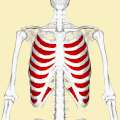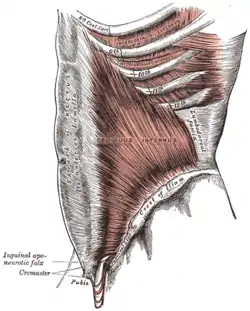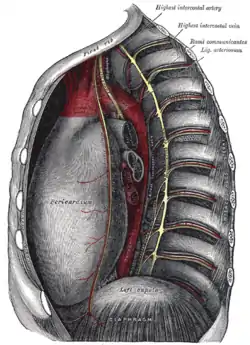| Internal intercostal muscles | |
|---|---|
 Internal intercostal muscles (red) seen from back. | |
| Details | |
| Origin | Rib - superior border |
| Insertion | Rib - inferior border |
| Artery | Intercostal arteries |
| Nerve | Intercostal nerves |
| Actions | Hold ribs steady |
| Antagonist | External intercostal muscles |
| Identifiers | |
| Latin | Musculi intercostales interni |
| TA98 | A04.4.01.013 |
| TA2 | 2312 |
| FMA | 74085 |
| Anatomical terms of muscle | |
The internal intercostal muscles (intercostales interni) are a group of skeletal muscles located between the ribs. They are eleven in number on either side. They commence anteriorly at the sternum, in the intercostal spaces between the cartilages of the true ribs, and at the anterior extremities of the cartilages of the false ribs, and extend backward as far as the angles of the ribs, hence they are continued to the vertebral column by thin aponeuroses, the posterior intercostal membranes. They pull the sternum and ribs upward and inward.
Structure
Their fibers are also directed obliquely, but pass in a direction opposite to those of the external intercostal muscles. The internal intercostal muscles originate from the costal groove of the rib and insert into the superior aspect of the rib below in a direction perpendicular to the external intercostal muscles. It is this arrangement that allows these muscles to facilitate exhalation.[1]
For the most part, they are muscles of exhalation. In exhalation the interosseous portions of the internal intercostal muscles, (the part of the muscle that is between the bone portion of the superior and inferior ribs), depresses and retracts the ribs, compressing the thoracic cavity and expelling air.[2] The internal intercostals, however, are only used in forceful exhalation such as coughing or during exercise and not in relaxed breathing.[3] The external intercostal muscles, and the parasternal part of the internal intercostal muscles, (the part of the muscle that lies between the cartilage portion of the superior and inferior ribs), are used in inspiration, by aiding in elevating the ribs and expanding the thoracic cavity.[4]
Additional images
 Position of internal intercostal muscles (red). Animation.
Position of internal intercostal muscles (red). Animation. The Obliquus internus abdominis.
The Obliquus internus abdominis. Thoracic portion of the sympathetic trunk.
Thoracic portion of the sympathetic trunk.
References
![]() This article incorporates text in the public domain from page 403 of the 20th edition of Gray's Anatomy (1918)
This article incorporates text in the public domain from page 403 of the 20th edition of Gray's Anatomy (1918)
- ↑ Tang A, Bordoni B. Anatomy, Thorax, Muscles. [Updated 2020 Jul 27]. In: StatPearls [Internet]. Treasure Island (FL): StatPearls Publishing; 2020 Jan-. Available from: https://www.ncbi.nlm.nih.gov/books/NBK538321/
- ↑ Basic Human Anatomy - O'Rahilly, Müller, Carpenter & Swenson
- ↑ Anatomy and Physiology: The Unity of Form and Function 5th Edition by Kenneth Saladin
- ↑ "The Action of the Internal Intercostals". www.yorku.ca.
External links
- Anatomy photo:18:03-0101 at the SUNY Downstate Medical Center - "The Internal Intercostal Muscle"
- Anatomy figure: 18:03-03 at Human Anatomy Online, SUNY Downstate Medical Center - "Transverse section of thorax."